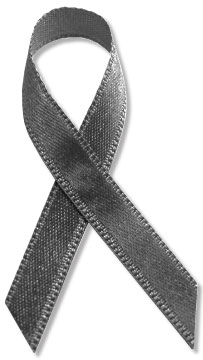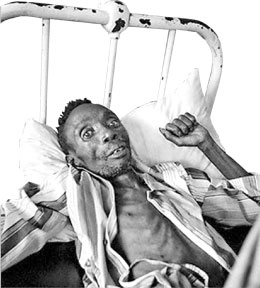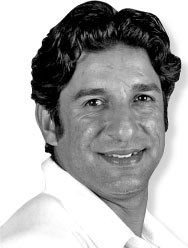|

World AIDS day falls on December 1 :
AIDS discrimination hampers HIV detection
by Nilma DOLE
 "When
we see the discrimination and social stigma that comes with the plight
of AIDS (Acquired Immune Deficiency Syndrome) victims, do we ever want
to check and see if we have been affected by the HIV(human
immunodeficiency virus)? asks President of the Sri Lanka College of
Venereologists Dr. G. Weerasinghe. "Instead of facing a society that
isn't merciful to AIDS victims, people continue to indulge in risky
behaviour and often know that they could be at risk of AIDS but don't
check themselves making them potentially dangerous to others," he
said.Moreover, sex education is still a taboo in Sri Lanka with
conservative culture encouraging abstinence until marriage but this
isn't the case in modern society. It's not easy to prevent many youth
from experimenting with sex and doing things without any proper
knowledge and it is the duty of parents to protect their children from
the dangers of AIDS and STDs (sexually-transmitted diseases) by
informing and guiding them properly. Isn't it better to overcome the
taboo of talking about sex to protect your children instead of finding
out they have the disease and are shunned by society? "When
we see the discrimination and social stigma that comes with the plight
of AIDS (Acquired Immune Deficiency Syndrome) victims, do we ever want
to check and see if we have been affected by the HIV(human
immunodeficiency virus)? asks President of the Sri Lanka College of
Venereologists Dr. G. Weerasinghe. "Instead of facing a society that
isn't merciful to AIDS victims, people continue to indulge in risky
behaviour and often know that they could be at risk of AIDS but don't
check themselves making them potentially dangerous to others," he
said.Moreover, sex education is still a taboo in Sri Lanka with
conservative culture encouraging abstinence until marriage but this
isn't the case in modern society. It's not easy to prevent many youth
from experimenting with sex and doing things without any proper
knowledge and it is the duty of parents to protect their children from
the dangers of AIDS and STDs (sexually-transmitted diseases) by
informing and guiding them properly. Isn't it better to overcome the
taboo of talking about sex to protect your children instead of finding
out they have the disease and are shunned by society?
Speaking to the Sunday Observer about the spread of AIDS in Sri
Lanka, Dr. Weerasinghe explained that it is estimated that there are
3000 people living with HIV. "From the end of the last year, we had 1196
AIDS cases detected which increased to 1285 which was detected in the
third quarter of this year (September 2010)," said the doctor.
He said that they are already working with sex workers who come to
the clinics to get their free condoms but people still have
misconceptions. "Often some partners think that their lovers don't trust
them with the use of a condom and there are issues where the police have
used condoms as a motive to arrest sex workers who engage in
prostitution," said Dr.Weerasinghe. He said,"We have to diversify our
education and awareness programs because we can't reach the upper class
society of Sri Lanka who know about the risks but don't take any
preventive measures due to a fast-paced and glamorous lifestyle," he
said. At present, the main centre for NSACP (National STD and AIDS
Control Programme) is located at 29, De Saram Place, Colombo 7 while
there are 29 clinics around the country with 19 partner clinics to do
HIV testing. "The AIDS tests done in the public sector with the NSACP
are 100 percent free of charge and 100 percent confidentiality
guaranteed," said the doctor. However, many don't use the benefit of the
services until they detect the disease very much later in life. "The
problem with AIDS is that the victim can lead a perfectly normal life as
the first signs of HIV virus multiplication begins in about seven years
but it takes a good 10 to 15 years for symptoms to really show," he
said.
Talking about the implications of the disease itself, the doctor
said,"The problem is that AIDS is a series of diseases that weakens the
human immune system and takes a long time to affect the patient.
However, it can multiply up to billions of copies of its virus so it's
important to treat the patient with drugs to stop the multiplication of
the disease without it affecting the rest of the patient's body." After
the treatment period with these drugs, there is a six to nine month gap
where one can't detect the HIV due to various reasons. "There is only so
little the treatment can do and prevented from taking over the body so
observation and honesty from the patient's side is vital in treating
AIDS," he said. There are only five places where antiretroviral drugs
are available - Colombo, Colombo-North, IDH, Colombo-South and Kandy.
"Sadly, we need specialists to administer the antiretroviral drugs so
we're training our doctors to help these patients," said Dr.Weerasinghe.
 The
doctor-patient relationship fosters understanding where the AIDS patient
should disclose the fact that they have HIV to their immediate partners
who they can trust and who they think could be infected. "We ask the
patients to disclose the fact that they have HIV but we don't push them.
But if someone knows they have AIDS and purposely doesn't tell the other
person and transmits the virus to them, the other party can file a
lawsuit against them which can be upsetting for both parties," said the
doctor.An AIDS patient gets special treatment for any of the concurrent
diseases that occur when AIDS takes its toll on them. "The availability
of antiretroviral therapy was done free of charge since December 2004
and our doctors personally accompany AIDS patients to get the services
because they are not to be discriminated," he said. The good news is
that if an AIDS patient is pregnant and is at risk of transmitting the
HIV virus to her baby, Sri Lanka's medical (public and private)
facilities can prevent the baby from contracting the virus. "We have
special measures to ensure that the mother's blood and the baby's blood
are not mixed and we get an alternative way of giving milk to the baby
because of the risk of the baby getting HIV," said the doctor. It has
been reported that an estimated 35 children are living with HIV in Sri
Lanka and 46 cases have been detected which has resulted in some deaths. The
doctor-patient relationship fosters understanding where the AIDS patient
should disclose the fact that they have HIV to their immediate partners
who they can trust and who they think could be infected. "We ask the
patients to disclose the fact that they have HIV but we don't push them.
But if someone knows they have AIDS and purposely doesn't tell the other
person and transmits the virus to them, the other party can file a
lawsuit against them which can be upsetting for both parties," said the
doctor.An AIDS patient gets special treatment for any of the concurrent
diseases that occur when AIDS takes its toll on them. "The availability
of antiretroviral therapy was done free of charge since December 2004
and our doctors personally accompany AIDS patients to get the services
because they are not to be discriminated," he said. The good news is
that if an AIDS patient is pregnant and is at risk of transmitting the
HIV virus to her baby, Sri Lanka's medical (public and private)
facilities can prevent the baby from contracting the virus. "We have
special measures to ensure that the mother's blood and the baby's blood
are not mixed and we get an alternative way of giving milk to the baby
because of the risk of the baby getting HIV," said the doctor. It has
been reported that an estimated 35 children are living with HIV in Sri
Lanka and 46 cases have been detected which has resulted in some deaths.
According to Dr.Weerasinghe, the international theme for AIDS this
time is 'Universal access and human rights' which focuses on reminding
people that HIV has not gone away, and that there are many things still
to be done. "The protection of human rights is fundamental to combating
the global HIV and AIDS epidemic and everyone should be responsible for
helping and treating AIDS patients without discrimination," said Dr.
Weerasinghe.
A special AIDS walk and discussion will be held at the Sri Lanka
Foundation Institute on December 1 and banners and leaflets will spread
the message of checking yourself for AIDS. So do yourself a favour and
save not only your life, but someone else's as well by checking if you
have HIV or not.
|
AIDS: Some facts
1. Acquired Immune
Deficiency Syndrome or Acquired Immunodeficiency Syndrome
(AIDS) is a disease of the human immune system caused by the
human immunodeficiency virus (HIV).
2. This condition
progressively reduces the effectiveness of the immune system
and leaves individuals susceptible to opportunistic
infections and tumours.
3. HIV is transmitted
through direct contact of a mucous membrane or the
bloodstream with a bodily fluid containing HIV, such as
blood, semen, vaginal fluid, preseminal fluid, and breast
milk.
4. This transmission can
involve anal, vaginal or oral sex, blood transfusion,
contaminated hypodermic needles, exchange between mother and
baby during pregnancy, childbirth, breastfeeding or other
exposure to one of the above bodily fluids.
5. AIDS is now a pandemic.
6. In 2007, it was estimated
that 33.2 million people lived with the disease worldwide,
and that AIDS killed an estimated 2.1 million people,
including 330,000 children.
7. Over three-quarters of
these deaths occurred in sub-Saharan Africa.
8. According to UNAIDS 2009
report, worldwide some 60 million people have been infected,
with some 25 million deaths, and 14 million orphaned
children in southern Africa alone since the epidemic began.
9. Genetic research
indicates that HIV originated in west-central Africa during
the late nineteenth or early twentieth century.
10. AIDS was first
recognized by the U.S. Centers for Disease Control and
Prevention in 1981 and its cause, HIV, identified in the
early 1980s.
11. Although treatments for
AIDS and HIV can slow the course of the disease, there is no
known cure or vaccine. Antiretroviral treatment reduces both
the mortality and the morbidity of HIV infection, but these
drugs are expensive and routine access to antiretroviral
medication is not available in all countries.
12. Due to the difficulty in
treating HIV infection, preventing infection is a key aim in
controlling the AIDS pandemic, with health organizations
promoting safe sex and needle-exchange programmes in
attempts to slow the spread of the virus.
(Courtesy Wikipedia) |
Peanuts during pregnancy may lead to later allergy
The children of mothers who eat a lot of peanuts while pregnant may
be at an increased risk of developing an allergy to the nut - and the
more peanuts the mothers ate, the greater the chances, a study found.
But it still is not yet clear if a mother's consumption of peanuts
can actually cause the serious and potentially fatal allergy that
appears to be on the rise, currently affecting about 1 percent of
children. Scott Sicherer of Mount Sinai School of Medicine in New York
City and a team of colleagues at five locations across the United States
studied more than 500 infants between 3 and 15 months old who likely had
a milk or egg allergy but not known peanut allergy. Most had not yet
tried to eat peanuts.The study, published in the Journal of Allergy and
Clinical Immunology, found that more than a quarter displayed a strong
reaction in a peanut "sensitivity" test, with children of mothers who
had consumed peanuts during pregnancy having nearly three times the odds
of showing this potential indication of an allergy.
The more peanuts a woman ate while pregnant, the greater her child's
chance of a positive test - although consuming peanuts while
breast-feeding did not appear to have a significant impact.
Reuters
'Air pollution, low birth-weight also cause diabetes'
by Jaya Shroff BHALLA
"While bad lifestyle and poor eating habits are major causes for
diabetes, air pollution, low birth weight babies, protein malnutrition
in the mother have also been identified as causes for the disease," said
Dr. Edward S. Horton, professor at Harvard Medical School and head of
the section on clinical research of Joslin Diabetes.
 |
|
Wasim Akram |
Experts on diabetes speaking at the HT leadership summit on Friday
expressed their worries on diabetes fast gaining pandemic proportions-
as they quoted predictions which said by year 2025, diabetes is expected
to affect 333 million people worldwide.
"In 2000, there were about 194 million people living with diabetes
worldwide but in 2003 it was predicted that the figures would rise to
333 million diabetics by 2025-a hike of almost 72 per cent," said Dr
Horton.
"Diabetes is a dual epidemic as it also comes with the burden of
obesity," he said. Experts also said that the spread could be prevented
only with changes in lifestyle. "Studies on diabetes risk reduction have
shown 58 per cent efficiency with changes in lifestyle and only 31 per
cent by use of metformin (medication)," said Horton.
"Both exercise and diet control are equally important if one wants to
reduce diabetes and associated complications like hypertension and heart
attacks," said Dr. Anoop Misra, director of department of diabetes and
metabolic diseases at Fortis Hospital, New Delhi. Dr Misra has been
instrumental in defining new guidelines for physical activity for the
Indian population. He stressed on the need for one hour of daily
physical exercise as a measure to tame the disease of the pancreas.
Wasim Akram, the former Pakistan cricket captain who was diagnosed
with type-I diabetes in 2003, when he was at the prime of his career
also shared his experiences of living with diabetes. "I went on to take
250 one-day wickets and 200 test match wickets after being diagnosed
with the disease. I was successful only because I was particular about
my eating as well as exercising habits," said Akram.
"Although I was taking three insulin jabs a day, it did not prevent
me from doing my regular exercises.
"In fact I broke the myth, that if you are a diabetic you get tired
easily as I was working out a lot more than my team mates to stay fit,"
he said.
-Hindustan Times
HIV pill heralds new era in fight against AIDS
by Jeremy LAURANCE
Scientists announced last week the first anti-HIV pill to provide
effective protection against the disease that affects 33 million people
globally.
Gay men at extremely high risk of HIV who took the oral pill daily
cut their risk of contracting the infection by almost 44 per cent. Aids
organisations and researchers said it heralded a new era of Aids
prevention. After the failure of almost 30 large-scale trials of
protective therapies, recent positive results for an Aids vaccine and
for a microbicidal gel suggest progress. "This discovery alters the HIV
prevention landscape for ever," said Jim Pickett of the Aids Foundation
of Chicago. Anthony Fauci, head of the National Institute for Allergy
and Infectious Diseases - which provided two thirds of the $43.6m
(£27.6m) cost of the study - said: "The results are extremely
important." Margaret Chan, director general of the World Health
Organisation, said the trial opened "exciting new prospects".
Almost 2,500 men from the US, South Africa, Thailand, Brazil, Ecuador
and Peru took part in the study. They were highly sexually-active,
reporting an average of 18 partners over 12 weeks, with 60 per cent
saying they had receptive, unprotected anal intercourse during that
time, the riskiest sexual activity for HIV.
Half the men took the pill, called Truvada, containing an
antiretroviral medicine, amongst whom there were 36 infections after 14
months. There were 64 infections among those who took a placebo,
amounting to a 43.8 per cent reduction with Truvada. All the men
received regular advice about how to reduce their risks, a supply of
condoms and treatment for other sexually transmitted infections. Kevin
O'Reilly, an HIV prevention specialist at WHO, said the results were
"somewhat weaker than had been hoped". Many of the men did not take the
drug regularly and protection was highest in those who had the most
consistent use.
He said side-effects were minor and compared the treatment to the use
of oral contraceptives by women.
"It is only one ARV and the most easily tolerated compared with three
taken by people who are HIV-positive and on treatment. Its safety has
been very well studied." The preventive strategy is also being trialled
in heterosexuals in Africa and injecting drug users in Thailand and the
results are expected next year.
The Independent
|

